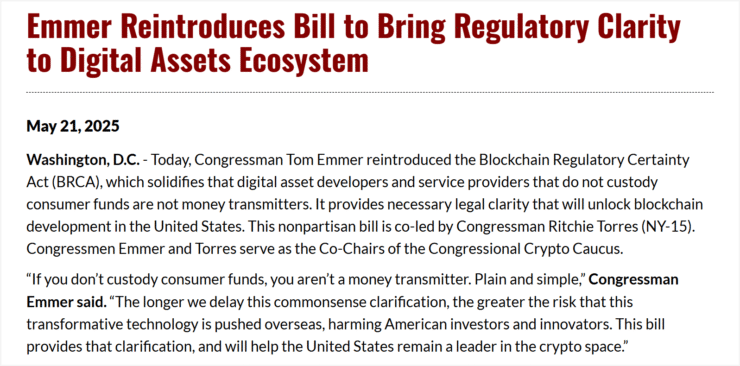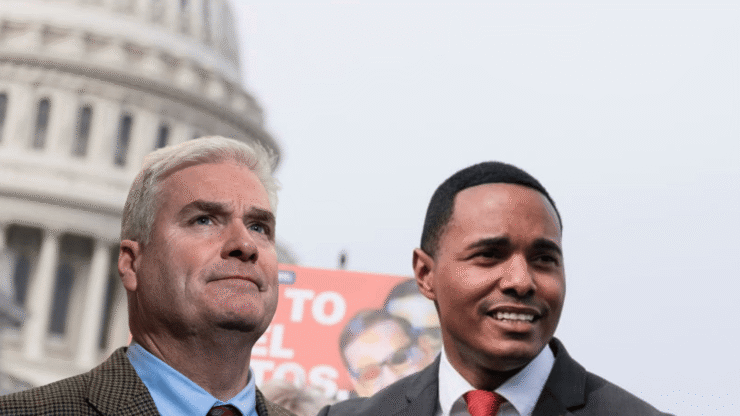U.S. Representatives Tom Emmer (R-MN) and Ritchie Torres (D-NY) have reintroduced the Blockchain Regulatory Certainty Act—a bipartisan bill aimed at shielding non-custodial crypto developers from being misclassified under outdated financial regulations.
The bill would establish that developers and operators of non-custodial platforms—such as miners, validators, and wallet developers—should not be treated as “money transmitters” or unlicensed financial service providers. If passed, it would address years of legal ambiguity surrounding decentralized blockchain participation.
In a joint statement, Emmer and Torres emphasized the need for legal clarity to prevent blockchain innovation from moving overseas.
“We can’t afford to drive U.S. blockchain talent overseas due to regulatory misinterpretations,” said Torres. He added that the legislation also protects civil liberties and strengthens America’s position in the global digital economy.
The proposal was quickly welcomed by industry stakeholders who have long argued that non-custodial participants—who don’t hold customer funds—should not face the same regulatory scrutiny as custodians. The bill’s reintroduction comes amid mounting calls for updated legislation tailored to the realities of decentralized finance.

Crypto Caucus Pushes for Legal Clarity in Blockchain
Representatives Emmer and Torres, co-founders of the newly launched Congressional Crypto Caucus, are leading efforts to modernize crypto regulation in the U.S. Their updated version of the Blockchain Regulatory Certainty Act (BRCA)—first proposed in 2018—comes as Congress grapples with competing visions for digital asset oversight.
The bill’s timing is significant. While several high-profile legislative proposals on stablecoins and crypto exchanges have advanced through committee, none have yet reached a full vote or President Donald Trump’s desk.
The BRCA aims to offer legal protection for builders of decentralized technologies who do not take custody of user assets. Its supporters argue that regulatory overreach threatens innovation and civil rights, especially in open-source blockchain ecosystems.
Peter Van Valkenburgh, executive director of Coin Center, called the legislation a necessary correction.
“Recent misapplications of financial licensing laws have chilled the development of technologies that protect privacy and support civil liberties,” he said.
“This bill reinforces the American tradition of free speech and innovation—it’s not a partisan issue, it’s a constitutional one.”
Sarah Milby, interim CEO of the Blockchain Association, also praised the move. She argued that developers of non-custodial infrastructure should not face the same compliance burdens as centralized custodians. “Regulatory ambiguity risks sending our best developers abroad,” she warned.
As political interest in digital assets rises, the BRCA could become a foundational piece in shaping how decentralized technologies are regulated in the United States.
Quick Facts
- Reps. Emmer and Torres reintroduced the Blockchain Regulatory Certainty Act.
- The bill seeks to exempt non-custodial developers from being classified as financial intermediaries.
- Industry leaders say the bill protects innovation, privacy, and civil liberties.
- The initiative aligns with broader bipartisan efforts to modernize crypto regulation.





